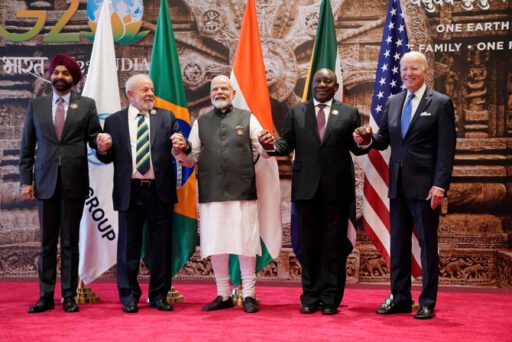
Introduction: India Steps into Global Spotlight
In early September 2023, India hosted the 18th G20 Summit at Bharat Mandapam, Pragati Maidan, New Delhi—the first time the country held this prestigious gathering. Under the slogan “Vasudhaiva Kutumbakam: One Earth, One Family, One Future”, India emphasized global unity, sustainability, and inclusive cooperation. The summit concluded with the unanimous adoption of the New Delhi Leaders’ Declaration, reflecting India’s success in forging consensus among deeply divided nations
Key Milestones and Breakthroughs
1. African Union Becomes Permanent G20 Member
A major historic step was the inclusion of the African Union (AU) as a permanent member—making the group more representative of the Global South and diversifying leadership beyond traditional G7 alignment Previously only South Africa attended, making AU’s induction a landmark moment for inclusive diplomacy
2. India‑Middle East‑Europe Economic Corridor (IMEC)
Leaders announced the launch of a vast India–Middle East–Europe Economic Corridor, a new rail and shipping network connecting India, Gulf nations, the European Union, and the United States. This infrastructure initiative is positioned as an alternative to China’s Belt and Road and underlines India’s growing strategic vision
3. Climate Action and SDG Financing
Despite disagreements over phrasing on fossil fuel phase‑out, G20 members endorsed an ambitious goal: tripling renewable energy capacity by 2030 and committing to mobilize $4 trillion annually for clean energy by 2030, and $5.8–5.9 trillion in climate financing for developing nations before 2030
The Declaration reaffirmed commitment to the 2030 Agenda for Sustainable Development (SDGs) across all member countries
4. Launch of Global Biofuel Alliance
India launched the Global Biofuel Alliance (GBA) with founding members including the United States, Brazil, and the UAE. The alliance is intended to accelerate adoption of sustainable biofuels globally, establish standards, and foster cooperation across industries and governments
5. Softening Language on Russia–Ukraine War
India managed to navigate sharp divisions by facilitating softer language regarding the conflict in Ukraine. The Declaration called for respect for sovereignty and territorial integrity, condemned war in principle, and emphasized humanitarian concerns—but stopped short of explicitly naming Russia
This diplomatic compromise, supported by Russia and China, demonstrated India’s skill in building consensus without confrontation
Behind the Scenes: India’s Strategic Diplomacy
Prime Minister Narendra Modi successfully leveraged the summit to elevate India’s voice in global governance. His insistence on AU membership, support for infrastructural collaboration, and climate financing created a clear narrative of India as a unifier of interests across the Global South and West
China’s President Xi Jinping did not attend the summit in person, sending Premier Li Qiang instead—a diplomatic setback for India. Still, Modi’s government balanced relations deftly between Western partners and Russia/China alignment
Amid global tension, India hosted over 100,000 participants from 135 nationalities, held 300 cultural events, and showcased its cultural richness at scale
What Did the Summit Achieve?
-
Strengthened Global South Representation
By bringing African Union into the fold, G20 moved from G20 to G21—sending a message that global governance should include voices beyond traditional powers - Infrastructure and Connectivity Momentum
The IMEC initiative kickstarted a geopolitically significant infrastructure vision, aimed at enhancing trade and building trust between continents - Climate and Finance Commitments
While climate rhetoric slowed, the summit set clear numeric targets for renewable expansion and climate finance—a partial win amid resistance from coal‑reliant nations - Institutional Reform & Economic Inclusion
Participants agreed on reforms of multilateral development banks, debt relief measures, and better support for MSMEs and cryptocurrency regulation - Cultural Diplomacy and Soft Power
Through local cuisine, arts, and ceremonial heritage like paying tribute at Rajghat, India projected its soft power during the summit closing
Global Reactions and Implications
Major outlets like AP, Reuters, and TIME praised India’s balancing act. The media highlighted consensus among G20 members despite ongoing global tensions, praising India’s diplomacy and leadership role. Some critics—especially from Ukraine—said the Declaration lacked strong condemnation of Russia; yet most global leaders still regarded the final statement as a diplomatic achievement.. The IMEC project was seen as a strategic infrastructure alternative to China’s BRI, and the biofuel alliance signaled India’s push for sustainable energy leadership. Climate activists noted the strong financial pledges, while others pointed out that binding commitments were still missing
Conclusion: A Turning Point for India and the G20
The New Delhi G20 Summit of 2023 marked a turning point in India’s global positioning. It illustrated India’s evolving diplomatic maturity—managing multilateral negotiations, aligning Global South priorities with global frameworks, and advancing initiatives in energy, infrastructure, and finance. It also signalled a shift in global power dynamics, with the Global South gaining greater representation and India emerging as a bridge-builder between different geopolitical blocs.
India successfully balanced national ambition with international sensitivity—producing a Declaration agreed by all 83 paragraphs, despite geopolitical rifts. As summit host, India brought the world together under the banner of inclusivity, sustainability, and shared progress.